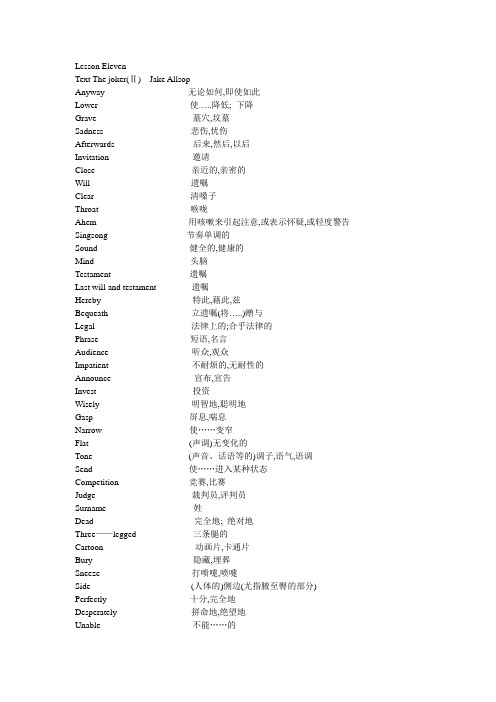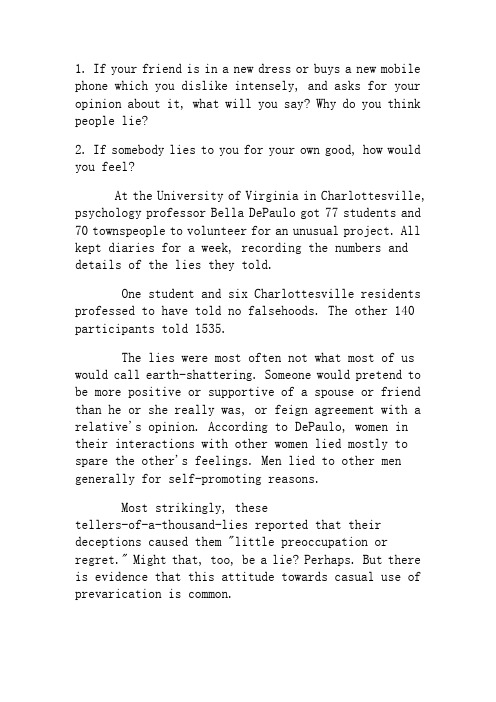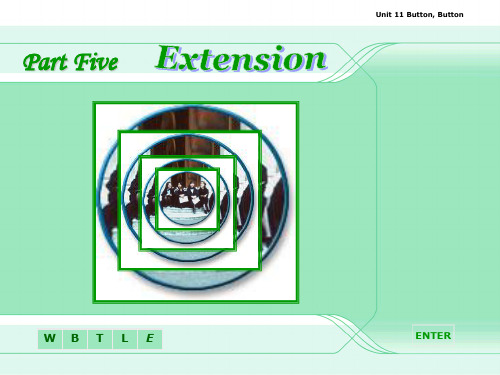英语专业综合英语Unit11PPT
UNIT11_重庆大学_商务英语_课件

5. T
1. permitted 2. enjoyed great popularity 3. be restricted by 4. win a victory over 5. keep thinking about
…featuring arresting images of athletes leaping out of bed … feature: When sth. such as a film features a particular person or thing, they are an important part of it. (电影等)由…主演 It‘s a great film which features a Spanish actor. 这是一部由一位西班牙 演员主演的精彩电影。
新时代商务英语专业系列教材
An Integrated Course of Business English
商务英语综合教程 2
主 编 副主编 李海峰 唐 梅
UNIT ELEVEN
Brand Image and Marketing
Pre-reading Questions Notes to Text A Key to Exercises Notes to TEXT B
2.
Notes to Text A
3. On Sept. 21, Marriott introduces a newly remodeled hotel room for its flagship hotels with a glass-enclosed replica in Times Square as a backdrop for music and comedy acts and even a wedding that will be captured by entertainment news cameras over four days and broadcast on Westwood One radio. 该句主干为 Marriott introduces a newly remodeled hotel room with a glass-enclosed replica。 as: 介词,表示作为。 that will be captured …: that 从句作定语修饰 a glass-enclosed replica。
综合英语一上册第十一课lesson eleven

Lesson ElevenText The joker(Ⅱ) Jake AllsopAnyway 无论如何,即使如此Lower 使…..降低; 下降Grave 墓穴,坟墓Sadness 悲伤,忧伤Afterwards 后来,然后,以后Invitation 邀请Close 亲近的,亲密的Will 遗嘱Clear 清嗓子Throat 喉咙Ahem 用咳嗽来引起注意,或表示怀疑,或轻度警告Singsong 节奏单调的Sound 健全的,健康的Mind 头脑Testament 遗嘱Last will and testament 遗嘱Hereby 特此,藉此,兹Bequeath 立遗嘱(将…..)赠与Legal 法律上的;合乎法律的Phrase 短语,名言Audience 听众,观众Impatient 不耐烦的,无耐性的Announce 宣布,宣告Invest 投资Wisely 明智地,聪明地Gasp 屏息,喘息Narrow 使……变窄Flat (声调)无变化的Tone (声音、话语等的)调子,语气,语调Send 使……进入某种状态Competition 竞赛,比赛Judge 裁判员,评判员Surname 姓Dead 完全地; 绝对地Three——legged 三条腿的Cartoon 动画片,卡通片Bury 隐藏,埋葬Sneeze 打喷嚏,喷嚏Side (人体的)侧边(尤指腋至臀的部分) Perfectly 十分,完全地Desperately 拼命地,绝望地Unable 不能……的Sweep 在……总迅速蔓延或传播Unnecessarily 不必要地,多余地Paragraph 段落Resist 忍住,忍耐(诱惑等) Overcome (战胜,克服)Equally 均等地,平等地Fall 变成(……的状态)Useful Expressionsgo on (doing) 继续by invitation 凭请柬read out 大声读出来clear one’s throat 清清喉咙settle down 平静下来in……circumstance 在……情况下fall/be in love with sb./sth. 爱上某人或某事(tears) stream down from (眼泪)从……流下) Suggest that sb. do sth 建议某人做某事Cover up 掩盖Make one’s sides ache 让某人笑疼肚子Hold in 抑制,克制Build up 增大,增强Blow one’s nose 擤(鼻涕)Burst out laughing/crying 突然笑或突然哭In no time 不一会儿Be doubled up 笑弯了腰Die down 减弱,减息Play a joke on sb. 开某人的玩笑As for 至于……,就……而言Divide equally among 在……间平分In debt 欠债I’m in debt to Bill for 100 yuan.It’s up to sb. (to do) 由某人决定;是某人的责任Which one shall we haveStart sb. off 使某人开始(某项活动) What started him off on that project?Sink in 被理解He paused, waiting for his words to sink in.Translate1)他清了清嗓子说道: “请继续吧!”He cleared his throat to say: “ Please, go on.”2)他们平静下来,等待着结果.They settled down, waiting for the result.3)他眯缝着眼睛,用平淡的声调做了回答.He narrowed his eyes and answered in a flat tone.4)我们依次同即将离开的朋友握了手.In turn we shook hands with the friends, who were going to leave. 5)是去是留该由你决定To go or leave, it’s up to you.6)看完信后,他眼里流出了泪水After he read the letter, tears streamed from his eyes.7)嘲笑别人的缺点是不友善的It is not friendly to laugh at other’s shortcomings.8)从他红通通的脸可以看出他知道自己错了From his red face we can see that he realized his own mistakes.9)你要是错了,就说自己错了,千万不要掩盖错误Never cover up the mistakes that you have really made.10)他努力把愤怒压了下去,从而避免了(avoid)一场打斗He held in the anger so well that a fight was avoided.11)当她听到这件事后,立即大笑起来,使得大家也全部笑了起来. When she heard it, she burst out laughing which started the others off.12)为了使这句话的意思能够得到充分的理解,我把它重复了两遍. In order to let this sentences sink in, I repeated it twice.21)她喜欢游泳She likes swimming2)我记得几年前见过此人I remember meeting the person several years ago.3)那些书你都读完了吗?Have you finished reading those books?4)他正在考虑出国学习He is considering studying abroad.5)他说这台计算机堆他来说很有用.He said that this computer was very useful for him.Question on the text1)Who were invited to the funeral breakfast? What for?Twelve of Henry’s closet friends were invited to the funeral breakfast. For the will of Henry Ground.2)How did they feel when Colin announced that Henry had left at least three-quarters of amillion pounds?They fill amazed. Everyone gasped. Eyes narrowed and throat went dry.3)Who was to get the money twelve people going to tell their jokes?The one who got the most laughter would get all the money.4)In what order were those twelve people going to tell their jokes?In alphabetical order of surnames, those twelve people were going to tell their jokes.5)The first person told a very funny joke, didn’t he? Why didn’t he get any laughter at all? Yes, he did.Because, not one of them was going to laugh and give him the chance to win the competition.6)Who told the second joke? It was a funny joke, wasn’t it? What did the others do when shefinished? Why?The surname was the second in alphabetical order told the second joke.Yes, it is.The others buried their faces in their handkerchiefs, coughed, pretended to sneeze and dropped pencils under the table. Because they did anything to cover up their laughter.7)All the twelve jokes were funny, weren’t they? Why did nobody dare to laugh? Why was therea painful silence when everyone had told a wonderful joke?All of the twelve jokes were very funny, but they desperately held in the laughter which was bursting to get out. There was a painful silence when one wonderful joke had been told because all of them were afraid that the other may get all Henry’s money by the most laughter, according to Henry’s will.8)What did Colin suddenly do? What did that lead someone to do? What happened after that? He suddenly sneezed.That led someone burst out laughing, unable to hold it in any longer.That started the others off. In no time, everyone was doubled up, tears streaming from their eyes, their shoulders rising and falling as wave after wave of laughter swept the crowed.9)What was everybody laughing at?Everybody was laughing at himself.10)Why did Henry play this practical joke on twelve best friends of his?Because he wanted them to set their need to laugh against their desire for money.11)Which of the twelve people get the money? Why was there a feeling of sadness when theyheard the last part of the will?His fortune would be divided equally among them.Because all of them loved him, that day was his funeral and they lost a good friend of theirs so they felt sad for the first time.12)What kind of a person was Henry Ground? Just a joker? A good-for-nothing?He was a person who liked to play jokes on others. He was not just a joker, nor a good-for-nothing,either.。
综合英语 unit 11 salvation(课堂PPT)

I make such a decision? 15. What was the reaction of the
whole church?
11
• The conflict • (Pa.6): He hasn’t seen Jesus while all
the young people have gone to the altar but Westley and him. • The climax • (Pa.7-10): He alone is left unsaved after Westley is “saved” by telling a lie. • The conflict resolved • (Pa. 11-14): He also tells a lie and is thus “saved” from both sin and trouble.
‘saved’. But his_______ was completely
7
Structural analysis
• Plot: • a literary term • the events that make up a story • particularly as they relate to one another in
Unit 11
Salvation
1
Para1: 1. When did the salvation take place? 2. How did I get a chance to be saved? 3. What was my aunt’s attitude towards
全国英语等级考试 第一级教程Unit11ppt课件

技能要求(Skills)
1.听力:听懂有关身体情况的简短文章和对话。 2.阅读:读懂有关身体健康情况介绍的文章,并回答 问题。 3.写作: 改写句子:掌握有关句型和表达方式,利用所学语 法结构和句型改写句子。 书面表达:简要介绍个人健康身体情况。 4.口语:熟读对话与课文,背诵对话语句,并就课文 内容进行对话问答。
CLOSE
decide to do
☆意为决定去做某事,停下来去做另外一件 事。 I decide to go to the USA for the further education.
CLOSE
stop doing/stop to do
☆ stop doing sth 表示停止做某事,指停止 做原来的事情。 Hearing the doorbell, she stopped washing the dishes. ☆ stop to do 表示停下(手头的事情)去做 另外一件事。 Hearing the doorbell, she stopped to open the door.
2. 重点训练词组 (Focal Expressions)
decide to do according to stop doing keep on doing too…to…
hold up need to do as…as… try to
3. 重点句型和习惯表达法 (Focal Functions and Patterns)
CLOSE
keep on doing/keep doing
1. 均可表示“继续做某事,反复做某事”,可互换, 只是keep on 更加强调时间的间隔性和动作的反 复性,及某人做某事的决心。 He kept on working until midnight though he was tired. 2. 若表示连续不断的动作,或某一动作的持续状态, 只宜用keep doing。 They kept standing outside the room during CLOSE all the meeting.
大学英语专业综合教程第三册Unit11课文及单词

1. If your friend is in a new dress or buys a new mobile phone which you dislike intensely, and asks for your opinion about it, what will you say? Why do you think people lie?2. If somebody lies to you for your own good, how would you feel?At the University of Virginia in Charlottesville, psychology professor Bella DePaulo got 77 students and 70 townspeople to volunteer for an unusual project. All kept diaries for a week, recording the numbers and details of the lies they told.One student and six Charlottesville residents professed to have told no falsehoods. The other 140 participants told 1535.The lies were most often not what most of us would call earth-shattering. Someone would pretend to be more positive or supportive of a spouse or friend than he or she really was, or feign agreement with a relative's opinion. According to DePaulo, women in their interactions with other women lied mostly to spare the other's feelings. Men lied to other men generally for self-promoting reasons.Most strikingly, these tellers-of-a-thousand-lies reported that their deceptions caused them "little preoccupation or regret." Might that, too, be a lie? Perhaps. But there is evidence that this attitude towards casual use of prevarication is common.For example, 20,000 middle-and high-schoolers were surveyed by the Josephson Institute of Ethics — anonprofit organization in Marina del Rey, California, devoted to character education. Ninety-two per cent of the teenagers admitted having lied to their parents in the previous year, and 73 per cent characterized themselves as "serial liars," meaning they told lies weekly. Despite these admissions, 91 per cent of all respondents said they were "satisfied with my own ethics and character."Think how often we hear the expressions "I'll call you" or "The check is in the mail" or "I'm sorry, but he stepped out." And then there are professions —lawyers, pundits, public relations consultants —whose members seem to specialize in shaping or spinning the truth to suit clients' needs.Little white lies have become ubiquitous, and the reasons we give each other for telling fibs are familiar. Consider, for example, a corporate executive whom I'll call Tom. He goes with his wife and son to his mother-in-law's home for a holiday dinner every year. Tom dislikes her "special" pumpkin pie intensely. Invariably he tells her how wonderful it is, to avoid hurting her feelings."What's wrong with that?" Tom asked Michael Josephson, president of the Josephson Institute. It's a question we might all ask.Josephson replied by asking Tom to consider the lie from his mother-in-law's point of view. Suppose that one day Tom's child blurts out the truth, and she discovers the deceit. Will she tell her son-in-law, "Thank you for caring so much"? Or is she more likelyto feel hurt and say, "How could you have misled me all these years? And what else have you lied to me about?"And what might Tom's mother-in-law now suspect about her own daughter? And will Tom's boy lie to his parents and yet be satisfied with his own character?How often do we compliment people on how well they look, or express our appreciation for gifts, when we don't really mean it? Surely, these "nice lies" are harmless and well-intended, a necessary social lubricant. But, like Tom, we should remember the words of English novelist Sir Walter Scott, who wrote, "What a tangled web we weave, when first we practice to deceive."Even seemingly harmless falsehoods can have unforeseen consequences. Philosopher Sissela Bok warns us that they can put us on a slippery slope. "After the first lies, others can come more easily," she wrote in her book Lying: Moral Choice in Public and Private Life. "Psychological barriers wear down; the ability to make more distinctions can coarsen; the liar's perception of his chances of being caught may warp."Take the pumpkin-pie lies. In the first place, it wasn't just that he wanted his mother-in-law to feel good. Whether he realized it or not, he really wanted her to think highly of him. And after the initial deceit he needed to tell more lies to cover up the first one.Who believes it anymore when they're told that the person they want to reach by phone is "in a meeting"? By itself, that kind of lie is of no great consequence.Still, the endless proliferation of these little prevarications does matter.Once they've become common enough, even the small untruths that are not meant to hurt encourage a certain cynicism and loss of trust. "When [trust] is damaged," warns Bok, "the community as a whole suffers; and when it is destroyed, societies falter and collapse."Are all white lies to be avoided at all costs? Not necessarily. The most understandable and forgivable lies are an exchange of what ethicists refer to as the principle of trust for the principle of caring, "like telling children about the tooth fairy, or deceiving someone to set them up for a surprise party," Josephson says. "Still, we must ask ourselves if we are willing to give our friends and associates the authority to lie to us whenever they think it is for our own good."Josephson suggests a simple test. If someone you lie to finds out the truth, will he thank you for caring? Or will he feel his long-term trust in you has been undermined?And if you're not sure, Mark Twain has given us a good rule of thumb. "When in doubt, tell the truth. It will confound your enemies and astound your friends."New words:volunteerv. to give or offer (one's help, a suggestion, etc.) willingly or without being paidprofessv. to make a claimfeignv. to pretend to have or bepreoccupationn. the state of constantly thinking or worrying about somethingprevaricationn. the state of avoiding giving a direct answer or making a firm decisionseriala. of, in or forming a number of things, events, etc. of a similar kind, especially placed or occurring one after anotherethicsn. moral correctness; moral principlespunditn. a person who is an authority on a particular subject; an expertconsultantn. a person who gives specialist professional advice to othersfibn. a small unimportant liedeceitn. dishonest act or statementlubricantn. a substance such as oil which cause a machine to operate more easilytanglev. to make or become a mass of disordered and twisted threadswear downto reduce or become weaker until uselessperceptionn. the ability to see, hear and understand; the quality of understandingwarpv. to (cause to) turn or twist out of shapeproliferationn. a rapid increase in the amount or number of somethingcynicismn. the belief that people always act selfishlyfalterv. to lose power or strength in an uneven way, thus no longer making much progressassociaten. a person who is connected to another person as a businesspartner, colleague, or companionunderminev. to gradually make somebody or something less strong or effectiveconfoundv. to confuse and greatly surprise people, causing them to be unable to explain or deal with a situationastoundv. to make somebody very surprised or shocked, especially with (news of) something completely unexpected。
综合英语课件Unit11-5extension

6. Bulletins about the president's health are broadcast _h_o_u_r_ly__. (hour)
Fill in the blanks with the proper form of the given words.
Unit 11 Button, Button
Brainstorm in groups.
Unit 11 Button, Button
I. Oral Work
Topics for Debating:
Task Two: Imagine that Mr. Steward selects your family to receive the box. Write a scene portraying your family’s reaction. Who in your family would want to go through with pushing the button? Who would be opposed to it? Write a 250-to-300-word narrative about the day Mr. Steward arrived and the decision that was made.
Cognitive control mechanisms: specific motives Self-control is key to a well-functioning life Psychological trauma: Physical, Emotional, Cultural and Moral distance Mirror neurons: influence of violent movies
综合英语 unit 11 salvation(课堂PPT)
Key phrases
• go on (a certain age)
• by/in leaps and bounds
• speak of
• feel … in one’s soul
• hold out one’s arms
• say in a whisper
• swirl all around sb.
5. My aunt knelt __a_t my knees and prayed _f_o_r me. 6.My aunt sobbed _o_u_t my name _to__ the priest.
7. Westley grinned down _a_t_ me proudly.
8. I would rather die than take the God ’s name _in__ 15
4
Am I really saved?
Para 15:
16. What did I do at the night of my salvation? Why? What did my aunt thought why?
17. Was I really saved?
18. What was the effect on me of the false salvation?
12
• The conclusion (Pa. 15):
• The concluding paragraph reveals the narrator's
remorseful disillusionment with religion. The
revelation is satirical and indignant due to the fact that he is saved in the sense that the religious ritual has been completed or he has answered the expectations of the old people, but he is not saved in any sense of reality. • Q: According to the last paragraph, do you agree with the statement that the author feels he has committed a sin by lying to everyone?
新编大学生基础英语综合教程第二册教学课件Unit 11--Lesson 3
body piercing
V
denim jackets
goth / punk / hippy headbanger
L
dreadlocks
dyed hair
R&S
ethic clothes
incense stick
W
rasta / hippy punk / goth hippy hippy
×
O Vocabulary
RI
5. pierce v. to make a small hole in sth, or to go through
LP
sth. with a sharp object
V
e.g.
I'm having my ears pierced on Saturday.
L
This sound, like all music, pierced my heart like a
L achieved mainstream popularity in the 1990s.
R&S
W
×
O Related Information
RI Norman Quentin Cook also known by the stage name Fatboy Slim, is an
LP English DJ, big beat musician, record producer and pioneer of the electronic
At 17, he had a criminal record for petty theft.
L
R&S
W
×
O Lexical Preparation
综合英语BookVIUnit11教材教学课件
Design additional activities based on the listening materials, such as role plays, debites, or writing tasks
Recommended expanded listening resources
Online resources
Complex senses with noun clauses acting as subjects, objects, or complexes to express complex ideas
Claims that modify verbs, objections, or other advertisements to provide additional information about time, place, cause, condition, etc
Verbs that express likelihood, necessity, ability, permission, or advice related to environmental actions and policies
02 Listening skills training
Selection and purpose of listening materials
and
props
Offering
constructive
feedback
and
guidance to help
students improve
their performance
Grammar
Important grammar structures for understanding and expressing ideas related to the topic, such as passive voice, non clauses, and advisory clauses
上外课件Unit11B第六册英语综合教程外教社
Paragraph 5 Part 2
➢ But if you are one of those who are
incapable of impersonal interests, you
may find that your life will be empty
unless you concern yourself with your
➢ Risk is one of the two most important variables that
investors concern with.风险为投资人所最关心 的两个变数之一。 ➢ It’s nothing for you to concern yourself with.这不是 你所要担心的, ➢ That is all you need to concern yourself with.那才 是你所要关心的。
constantly growing and renewing itself.美国是一 个年轻的国家,充满了活力,不断发展与 更新。
➢ vital, vitally; vitamine 第3页/共38页
3
callous
➢ adj. emotionally hardened
➢ The boss was callous to his employees .老板对他 的雇员冷酷无情。
Paragraph 4
➢ The other thing to be avoided is clinging to youth in the hope of sucking vigor from its vitality. When your children are grown up they want to live their own lives, and if you continue to be as interested in them as you were when they were young, you are likely to become a burden to them, unless they are unusually callous. I do not mean that one should be without interest in them, but one’s interest should be contemplative and, if possible, philanthropic, but not unduly emotiorent to their young as soon as their young can look after themselves, but human beings, owing to the length of infancy, find this difficult.
- 1、下载文档前请自行甄别文档内容的完整性,平台不提供额外的编辑、内容补充、找答案等附加服务。
- 2、"仅部分预览"的文档,不可在线预览部分如存在完整性等问题,可反馈申请退款(可完整预览的文档不适用该条件!)。
- 3、如文档侵犯您的权益,请联系客服反馈,我们会尽快为您处理(人工客服工作时间:9:00-18:30)。
smash [smæ ʃ] v.打碎, 粉碎, 猛撞 n.破碎, 撞击, 轰动的演出, [网球]扣球 adj.极为成功的 例句: The elephant smashed through the trees. 大象在树林中横冲直撞。 I'll smash you in the eye! 当心我给你眼睛一拳! The lock was rusty, so we had to smash the door open.
The story of an Eyewitness
Jack London Made by 钱董秦 王璐 周锦婷 曹玲 徐冰枞 王倩
The preview of words
Ph 4 ghetto ['getəu] n. 少数民族聚居区, 贫民区, 犹太人区 例句: Draws moving scenes of ghetto life. 生动地描写了贫民窟生活的片断 A section of a medieval city inhabited by Jews; a ghetto. 犹太人居住区犹太人在中世纪居住的城市的一部 分; (城市中的)犹太人区
colossal [kə'lɔsl] adj. 巨大的, <口>异常的 例句: It requires government spending on a colossal scale.
paraphrase
The heated air rising made an enormous suck .<line5> The air heated by the fire rose to the sky and caused the cold current to pour in from other places. It seemed as if it was sucking the wind . 注: Personification
debris [də'bri:] n.碎片, 残骸 例句: They had to wade knee-deep through mud and debris to reach the victims. 他们须通过齐膝的烂泥和堆积物,磕磕绊绊来到 遇难者身旁。 The sea tided the debris ashore. 潮水把碎片杂物冲上海滩。
dynamite ['dainəmait] n.炸药, 引起轰动的人(或物) vt.炸毁 adj.极好的 例句: Dynamite is an explosive. 炸药是爆炸物。 Abortion issues are political dynamite. 堕胎问题在政治上是个爆炸性问题。 Their new album is really dynamite. 他们这套新唱片一下子轰动起来。
hump [hʌmp] n.驼背, 圆形隆起物,土墩,肿块,碰撞,恼火 v.使隆起,碰撞,敲击成圆丘形,弓起 例句: I have got the hump over what he say to me. 我为他对我说的话而感到恼火。 That gives me the hump. 那使我心烦。 A cat often humps its back. 猫常弓起背部。
perpendicular [ˌpə:pən'dikjulə] adj.垂直的, 直立的, 陡峭的 n.垂直线 例句: He'd drunk so much that he found it hard to remain perpendicular. 他喝酒太多,简直站都站不直了。 The wall is a little out of the perpendicular. 那墙有点斜。 There are many perpendicular marble columns in Greek temples. 希腊庙宇有很多垂直的大理石柱。
Out of gear
M: out of control Eg.: The virus threw the whole computer system out of gear.
twitch
twitch [twitʃ] v. 急拉, 抽动, 痉挛, 抽搐 n. 扯, 阵痛, 痉挛 例句: She twitched the corner of the rug to straighten it. 她拉了拉小地毯的一角,把它弄正。 She twitched the curtain into place. 她猛地拉好窗帘。 His face twitched with pain. 他的脸疼得直抽搐。
Perpendicular Adj. At an angle of 90°to a given line, plane, or surface
Horizontal Adj. Parallel to the plane of the horizon; at right angles to the vertical
Ph5:
flicker ['flikə] n. 闪烁, 闪光, 颤动 v. 闪动, 闪烁, 摇动 例句: All the lights flickered for a moment. 所有的灯都闪了一会儿。 A slender smile still flickered across her face. 她脸上闪过一丝微笑。
Line5-7
The streets were humped into ridges and depressions… The streets were no longer smooth after the earthquake…
Line8-10
All the shrewd contrivances and safeguards of man had been thrown out of gear by thirty seconds’ twitching of the earth-crust. All the complicated devices and inventions made with ingenuity by human being and those protective measures had been out of control and become useless because of thirty seconds’ sudden pull and tremor of the earthcust.
withstand [wið'stæ nd] vt.对抗, 经得起, 承受 例句: I couldn't withstand the murderous heat. 热得要命,我受不了。 I couldn't withstand a murderous-looking knife. 我无法忍受凶光闪闪的刀。 They could not withstand the fierceness of attack of those soldiers. 他们抵挡不住那些士兵猛烈的进攻。
Line 7
…the wind was often half a gale , so mighty was the suck . …the suck was so strong that for most of the time the wind was only half a gale.
Ph6
lavishly ['læ viʃli] adv. 浪费地, 丰富地, 大方地 例句: Spent lavishly on dinner just for effect. 晚餐吃得很奢侈浪费只是为了面子上好看 His house is lavishly adorned. 他的家装饰得非常华丽。
depression [di'preʃən] n.沮丧, 萧条 例句: The threat of an economic depression hangs over the world. 经济衰退的威胁笼罩着世界。 Her feeling of depression was transient. 她那抑郁的心情一会儿就过去了。 Many people were idle during the depression. 在那萧条时期,很多人都无事可做。Biblioteka paraphrase
There was no opposing the flames. There was no organization, no communication. <Ph4 line3 > It was impossible to oppose the flames, and it was impossible to organize any battles against the fire or communicate with other people.
ridge [ridʒ] n.脊, 山脊, 山脉, 隆起部 v.(使)成山脊 例句: The floor of the atlantic ridge in the middle from north to south. 大西洋洋底在中部形成由北向南的海脊。 The evening before the battle, Wellington took up a defensive position along, and to the rear of, a long ridge. 那场战斗的前夜,威灵顿沿一条长长的山脊背后占据了一个防守阵 地。 He walked along the mountain ridge. 他顺着山脊走。
